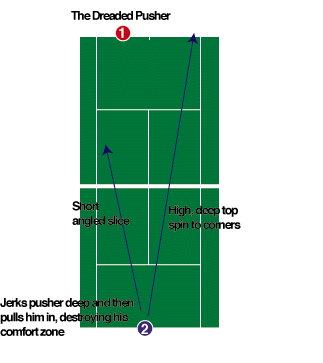|
TennisOne Lessons


How to Play A Pusher
By Monty Basnyat, TennisONE Associate Editor
Question
How do you play against a player who constantly plays soft balls and lobs? I play from the baseline aggressively.
Answer
 In his book, "Winning Ugly," Brad Gilbert passes on some good advice from his college coach Allen Fox which I'll now relay to you. When you're playing, you always have to ask yourself, "Who's hurting who with what?" If your softball (pusher) opponent is controlling the points and playing his favorite softball brand of play, you're probably in trouble--unless you play that style better than he does. The pusher's strategy is stay in the backcourt, taking his time to setup and pushing soft shot after soft shot at you until you make an error. Psychologically, the pusher likes consistency and has the patience to stay out on the court until the end of time. In his book, "Winning Ugly," Brad Gilbert passes on some good advice from his college coach Allen Fox which I'll now relay to you. When you're playing, you always have to ask yourself, "Who's hurting who with what?" If your softball (pusher) opponent is controlling the points and playing his favorite softball brand of play, you're probably in trouble--unless you play that style better than he does. The pusher's strategy is stay in the backcourt, taking his time to setup and pushing soft shot after soft shot at you until you make an error. Psychologically, the pusher likes consistency and has the patience to stay out on the court until the end of time.
The first strategic decision you have to implement against the pusher is decide to play your game, not his. While you don't want to become too aggressive or overhit, which only falls into the trap set by the pusher, you don't want to underhit or become too tentative either. Find a pace where you can continue to play aggressively but still keep the ball in play.
The second strategy, particularly for someone like yourself who is an aggressive baseline player, is to try to force the pusher in a defensive mode by pushing him deep into the corners with high top spin shots and pulling him into the net with low-angled slices . By constantly jerking your opponent back and forward, and by varying the pace and spin, you take the pusher, who hates the net and thrives on boring, baseline rallies, out of his comfort zone. Now you are hurting him, and not vice versa. This style of play will also force your opponent into short replies, which you can then jump on for winners.
Having said all that, it's important that you enter the match against a pusher in the right frame of mind. Mentally prepare yourself to stay out there longer and hit more balls than you are used to doing. But even more importantly, walk onto the court determined to make your opponent play your game.
|
|